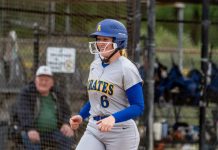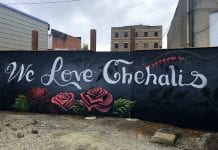In that quest for athletic greatness, in that commitment to victory, there needs to a driven and focused effort. There needs to be many hours of hard workouts and practice, both on and off the field. And sometimes that commitment can eclipse the classroom.
But not for the Adna Pirates baseball team. They’re a success on the field – they took second in the Central 2B Conference with a 21-4 record and reached the playoffs – and they’re also a success in the classroom. In their quest for greatness on the field, they haven’t forgotten the classroom.

These Pirates have a knack for belting RBI singles and chasing down fly balls, robbing opponents of another hit. They’re also whizzes in the classroom. With a cumulative GPA of 3.78 for the 17 players on their roster, they’re this state’s 2B academic champions for spring baseball.
They’re double winners.
“This group of kids, they’re just great kids, with great parents,” said Jon Rooklidge, Adna’s baseball coach. “They’re great kids of character, is what they really are. The academic part just goes right with that.”
Besides being good at swinging a bat and scooping grounders, Rooklidge sees a strong work ethic in his players. And they have a cooperative, get-along attitude. “They just don’t complain,” he said. “They don’t panic. They do things the right way and they treat each other well. You don’t get a lot of the same concerns that you do with other teams. So much of it is the academics, the character. It all factors in. They’re just a neat group of kids to work with.”

Rooklidge figured the other coaches at Adna would say the same thing about this group of kids who are the true definition of student-athlete. “They’re just outstanding kids,” he said. “We’re having success across the board in three different sports. I think the character and the academic part is a big part of it.”
Leading the way are seniors Conner Weed and Cody Young. Weed, a starter on the varsity baseball team since he was a freshman, carries an impressive 3.975 cumulative grade point average. The only “blemishes” on his high school report card have been two A-minuses – one in Washington State history and one in biology. And those “disasters” happened his freshman and sophomore years.
Weed, while getting all-league honors in football, basketball and baseball over the years, has never had a sports-come-first attitude. “I just feel school is emphasized and sports isn’t something you have to do,” Weed said at a recent practice. “It’s more of a privilege. School comes first.”
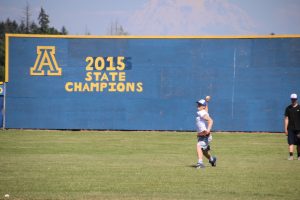
Weed, who plans on going to Washington State University in the fall, always had that prodding nudge to get his homework done from his parents.
“They’ll push me in the right direction every once in a while, but I’m more self-motivated,” said Weed, who has had good grades since first grade. He also attributes good genes to his “A” success. “Both my parents are smart,” Weed said. “They went to college.”
Like Weed, Young is good with a baseball glove and a textbook. He’s started in center field for the Pirates since he was a sophomore. However, this spring, Weed was demoted to sideline cheerer because he broke his arm playing basketball in the district playoffs. Just last week he started doing fielding and batting practice with his team. It’s been tough being demoted to the sidelines.
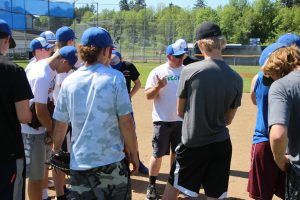
But Young, who was first-team, all-state in basketball and will play basketball at Lower Columbia College next year on a scholarship, hasn’t slipped in the classroom. His favorite subject is English and he has a 3.8 cumulative GPA. “That’s really going to help me out in college,” Young said.
But even as a first-team, all-state selection in basketball, the classroom hasn’t been pushed aside by sports. Over the years, Young said he had some helpful reminders to get his studies done. “My mom, she’s always there,” Young said. “She always asks me if I have homework. We always try to find time. Even if it means I have to stay up late. I’ll just finish it. If not, I’ll wake up early the next morning and finish it then.”
With late basketball games on the road sometimes getting him home late, studies sometimes got pushed to a last minute thing. But he always gets it done. “I’ll get home from basketball practice or a basketball game and I’ll go, ‘I can’t do it now,’ and go to sleep,” Young said. “And I’ll wake up early and get it done.”
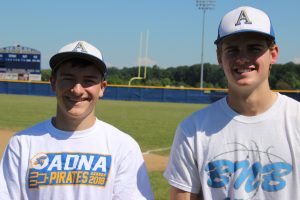
In Rooklidge’s years as a coach, he’s seen time and time again the life lessons that sports teach. He’s seen how sports have taught the importance of hard work, creating a strong work ethic that a kid will carry for the rest of their lives.
Rooklidge thinks that academic link connects to the baseball field. He sees a connection between his team’s success on the field and in the classroom. “When the leaders of the team are locked in that way, they’ve got an effect on everybody,” Rooklidge said. “And everybody is moving in that direction. It’s just an easy group to work with.”
As an example, Rooklidge talked about how his team mows and lays the chalk lines on the baseball field. “They’re just a unique group of kids who have it together,” Rooklidge said. “One of our assistant coaches, Kevin Ryan, the other day asked a simple question while the kids were stretching. He said, ‘Tell me which of these kids will not be successful in life.’ His point was these kids are all winners.”










